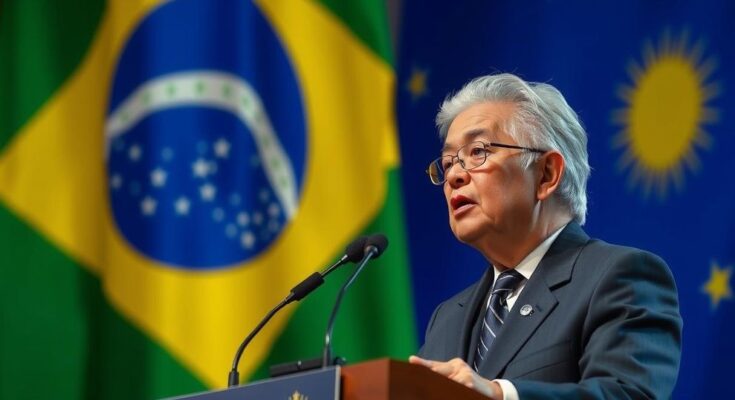At the G20 Summit in Rio de Janeiro, Brazilian President Lula launched an anti-poverty and hunger alliance supported by 81 countries. The summit, overshadowed by conflicts in Ukraine and the Middle East, also focuses on climate change and its related financing issues, with significant participation from global leaders. U.S. President Biden’s policy shift regarding Ukraine and the notable absence of Russian President Putin are key highlights.
Brazilian President Luiz Inacio Lula da Silva commenced the Group of 20 (G20) Summit in Rio de Janeiro by announcing a global alliance dedicated to addressing poverty and hunger, reinforcing his commitment to social issues. He emphasized that political choices largely contribute to these challenges and underlined the urgent effects of climate change, urging world leaders to undertake significant actions. The newly formed initiative has garnered support from 81 countries, including 18 of the 19 G20 nations, while notably excluding Argentina under President Javier Milei’s leadership. The summit, occurring amid ongoing conflicts in the Middle East and Ukraine, has also served as a platform for Lula to advocate for initiatives he deems crucial, such as combating hunger and taxing the ultra-wealthy. Despite Ukraine not being a formal agenda item, discussions related to it are anticipated to transpire informally among the attendees. Russia’s President Vladimir Putin, facing an ICC arrest warrant, is not attending; he is instead represented by Foreign Minister Sergey Lavrov. U.S. President Joe Biden’s participation marks his final appearance at the G20, where he is reportedly promoting an adjustment to U.S. policy, allowing Ukraine to utilize long-range missiles against Russian targets. This development may influence the positions of European allies significantly. At the same time, leaders are pressed to take decisive action on stalled climate talks during COP29 in Azerbaijan, focusing on climate financing for developing nations and the collective responsibility of the G20, which produces 80 percent of global emissions. Notably, security measures have been heightened in the wake of a recent failed bomb attack on Brazil’s Supreme Court, attributed to a suspected extremist. Furthermore, President Xi Jinping of China announced a collaborative initiative with Brazil, South Africa, and the African Union to promote technological advancements in the Global South, amidst global trade tensions.
The G20 Summit convenes the world’s major economies, addressing pressing global issues such as poverty, hunger, and climate change. With Brazil hosting this year’s discussions, President Lula has leveraged the summit to emphasize these critical concerns, highlighting the role of political decision-making in exacerbating these global issues. The gathering is set against a backdrop of geopolitical tensions stemming from wars in Ukraine and the Middle East, influencing discussions surrounding international cooperation and climate action. The significance of addressing climate change and related finance for developing countries has become increasingly paramount, particularly in light of recent global climate talks that have stalled without a resolution. This summit marks a pivotal moment for Brazil as Lula seeks to establish a leadership role within the global dialogue, advocating for solidarity in the fight against hunger and environmental degradation while navigating complex international relations, particularly with the absence of some notable leaders due to ongoing conflicts.
In conclusion, President Lula’s unveiling of the anti-poverty and hunger alliance at the G20 Summit reflects a strong commitment to addressing pressing global challenges through international collaboration. The exclusion of Argentina from the initiative, alongside the backdrop of geopolitical conflicts and economic considerations, underscores the complexities facing global leaders. As the summit progresses, the discussions around climate action and its financing remain crucial, demanding collective efforts from both developed and developing nations to forge an equitable global future.
Original Source: www.aljazeera.com




